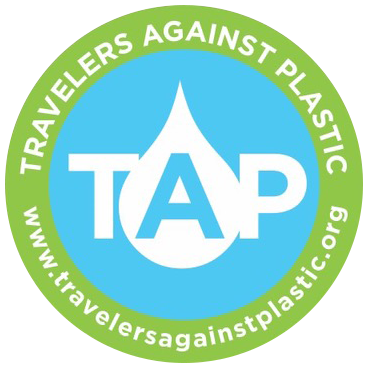30 Day Plastic Free Challenge
It’s not easy to avoid plastic in your life. Everywhere you turn from the moment you wake up and brush your teeth with your plastic toothbrush till you eat your takeout dinner with plastic utensils, plastic is infiltrating our lives in both big and small ways. There are obvious ways to use less plastic like avoiding plastic water bottles and less obvious ways like using razors with changeable heads. We’ve put together a 30 day guide to plastic free choices to help you get on top of your plastic use and start leading a more sustainable life. Take each day one step at a time and try to find meaningful habits you can stick to long term!
BYO Shopping Bags: Always carry reusable shopping bags with you when heading out. Whether you're grocery shopping or buying clothes, say no to plastic bags and opt for eco-friendly alternatives.
Skip the Straw: When enjoying your favorite drink, skip the plastic straw. If needed, switch to reusable or biodegradable options like bamboo, metal, or glass straws. Americans use half a billion drinking straws every day.2
Choose Reusable Drink Bottles: Stay hydrated while reducing plastic waste by carrying your own reusable water bottle. Choose options made of stainless steel, glass, or BPA-free plastic. Humans use about 1.2 million plastic bottles per minute in total and roughly 91% of plastic is not recycled.3
Switch from Bottle to Bar Soap: Ditch plastic bottles of liquid soap and choose bar soap instead. It's just as effective, often comes with minimal packaging, and eliminates the need for plastic bottles.
Buy Your Groceries in Bulk: Opt for bulk bins when shopping for staples like grains, nuts, and spices. Bring your own containers or reusable bags to avoid unnecessary plastic packaging.
Grab a Bamboo Toothbrush: Swap your plastic toothbrush for a biodegradable bamboo toothbrush. Bamboo is a sustainable alternative that decomposes naturally.
Wash Your Clothes in Mesh Bags: Use mesh laundry bags to wash your clothes in the machine. This prevents microfibers from synthetic fabrics from entering water systems and polluting our oceans.
Try Beeswax over Plastic Wrap: Replace single-use plastic wrap with beeswax wraps. These reusable and washable wraps are a sustainable way to keep your food fresh.
Bring Your Own Take-Out Containers: When ordering take-out or bringing home leftovers, bring your own reusable containers instead of relying on plastic or styrofoam containers.
Buy Concentrate Cleaning Supplies: Opt for concentrated cleaning supplies that can be diluted with water. This reduces the need for plastic packaging and minimizes waste.
Swap Makeup Wipes for Cloth Face Rounds: Replace disposable makeup wipes with reusable cloth face rounds. They are gentle on the skin and can be washed and reused, reducing plastic waste.
Sip Your Tea from Refillable Bags: Instead of single-use tea bags, choose loose-leaf tea and use refillable tea bags or infusers made of cloth or stainless steel.
Invest in a Razor with Replaceable Blades: Traditional razors with replaceable blades are a sustainable alternative to disposable razors, reducing plastic waste.
Travel with Refillable Toiletry Bottles: When traveling, transfer your toiletries into reusable travel-sized bottles instead of purchasing travel-sized plastic containers.
Light Matches Instead of Plastic Lighters: Instead of disposable plastic lighters, opt for matches or invest in a refillable metal lighter.
Use Plant-Based Cellulose Sponges: Choose sponges made from plant-based cellulose rather than synthetic materials. They are biodegradable and better for the environment.
Store Your Leftovers in Tupperware: Avoid single-use plastic wrap or bags when storing leftovers. Use reusable containers like Tupperware or glass jars instead. Five trillion plastic bags are produced worldwide annually. A single bag can take up to 1,000 years to disintegrate.4
Use Wooden Hangers: Replace plastic hangers in your closet with wooden ones. They are durable, eco-friendly, and add a touch of elegance to your wardrobe.
Choose a Recycled or Plant-Based Phone Case: Opt for phone cases made from recycled materials or plant-based alternatives, reducing the demand for new plastic production.
Make Your Own Snack Food: Prepare homemade snacks instead of buying pre-packaged ones. Store them in reusable containers or beeswax wraps for a plastic-free option.
Bag Your Produce in Mesh or Net Bags: Instead of using plastic bags for fruits and vegetables, carry reusable mesh or net bags when grocery shopping.
Swap Paper Towels for Cloth Rags: Replace single-use paper towels with reusable cloth rags or old T-shirts. They are just as effective and can be washed and reused.
Consider Cloth Diapers: If you have a baby, consider using cloth diapers instead of disposable ones. They are reusable and have a lower impact on the environment.
Say No to Plastic Lids: When buying beverages on the go, skip the plastic lids and use a reusable cup with a lid or bring your own travel mug. Keep a mug in your car or bag for convenience.
Pick Plastic-Free Loose Produce: Choose loose produce instead of pre-packaged fruits and vegetables. This helps reduce unnecessary plastic packaging.
Pack Boxes with Junk Mail Instead of Bubble Wrap: When shipping or moving, use junk mail or old newspaper instead of plastic bubble wrap to cushion fragile items.
Switch to E-Bills: Opt for electronic bills and statements to reduce paper waste. This eliminates the need for plastic window envelopes as well.
Avoid Plastic Utensils: Carry reusable cutlery or bamboo utensils in your bag or purse to avoid using plastic utensils when eating out or ordering take-out.
Skip the Plastic Liner for Your Trashcan: Line your trashcan with newspaper or go liner-free if possible. This reduces the use of plastic garbage bags.
Choose Reusable Party Decorations: When hosting parties or events, opt for reusable decorations like banners, fabric tablecloths, and real dishes instead of disposable plastic options.


